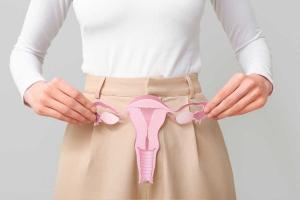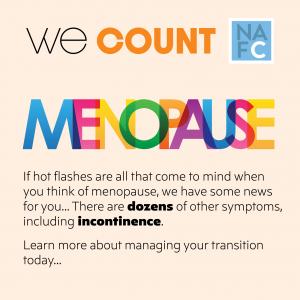NAFC Shines Light on the Connection Between Menopause and Incontinence in September/October 'We Count' Campaign
Incontinence during menopause is common, but treatable. NAFC is shining the light on the relationship between these two women's health issues.
“So many women in menopause experience bladder leaks, and unfortunately, they think it’s just part of getting older or something they have to live with, but that couldn’t be further from the truth.”
CHARLESTON, SC, UNITED STATES, September 18, 2025 /EINPresswire.com/ -- The National Association for Continence (NAFC) is continuing its groundbreaking “We Count” campaign with a September/October spotlight on the relationship between menopause and urinary incontinence, a significant but often overlooked women’s health issue. This latest initiative aims to destigmatize the conversation around bladder health, highlight the impact of hormonal changes during midlife, and empower women to seek care and treatment.— Sarah Jenkins
Menopause and Incontinence: A Common but Taboo Experience
Each year, over 1 million women in the United States enter menopause, a natural biological transition that typically occurs between the ages of 45 and 55. While symptoms like hot flashes, night sweats, and mood changes are widely discussed, urinary incontinence remains one of the least talked about but most distressing concerns during this life stage.
Research shows a strong link between menopause and bladder control problems due to declining estrogen levels, which affect the pelvic floor muscles and tissues that support the bladder. Despite its prevalence, the topic is rarely discussed openly, leaving many women feeling isolated and unsure where to turn for help.
Key statistics include:
-Nearly 50 to 60 percent of postmenopausal women experience some form of urinary incontinence.
-Women who have gone through menopause are twice as likely to develop incontinence compared to premenopausal women.
-Up to 40 percent of women in perimenopause report new or worsening bladder leakage symptoms.
-Only one in four women with menopause-related incontinence seeks treatment or even brings it up with their doctor.
The lack of dialogue around this issue has real consequences. Untreated incontinence can limit social activities, affect intimacy and relationships, and contribute to depression and anxiety. A recent survey by NAFC found that more than 90 percent of those with bladder leakage report a negative impact on their emotional well-being, yet few receive the support they need.
“So many women in menopause start experiencing bladder leaks, and unfortunately, they think it’s just part of getting older or something they have to live with,” says Sarah Jenkins, Executive Director of NAFC. “But that couldn’t be further from the truth. These symptoms are common, but they are treatable.”
Raising Awareness and Offering Solutions
Throughout September and October, NAFC will be shining a spotlight on this important issue with a robust educational and awareness campaign designed to break the stigma, share resources, and promote effective treatment options.
The campaign will include:
-Social media campaigns featuring facts, myths, and supportive messages to spark conversation and normalize discussions about bladder health.
-New educational articles addressing lifestyle strategies such as diet, exercise, and bladder training, pelvic floor therapy, non-surgical treatments like medications and devices, and when to consider surgical options.
-Free downloadable tools, including a Menopause and Incontinence Fact Sheet, bladder diaries to track symptoms, and conversation guides to help women talk to their healthcare providers confidently and effectively.
This effort builds on the success of NAFC’s broader We Count initiative, launched earlier this year, which focuses on elevating conversations about bladder health and reducing the stigma surrounding incontinence for women of all ages.
A Message of Empowerment
Menopause does not have to mean the end of bladder control or confidence. Evidence-based treatments, including pelvic floor physical therapy, have been shown to improve or eliminate symptoms for many women. Lifestyle changes such as maintaining a healthy weight and avoiding bladder irritants can also make a meaningful difference.
“We want every woman to know that if you are leaking, you are not alone and you do not have to just live with it,” says Jenkins. “This campaign is about education, action, and hope. No one should suffer in silence when safe, effective treatments exist.”
The Bigger Picture: Women’s Health Matters
Women’s health has long been underfunded and under-researched. Incontinence alone affects an estimated 25 to 45 percent of adult women in the United States, yet it remains a taboo subject, often dismissed as a normal part of aging rather than a medical condition that can and should be treated.
The economic impact is also significant. Studies estimate that incontinence costs the U.S. healthcare system over 20 billion dollars annually in direct medical expenses and lost productivity. By raising awareness and promoting treatment, campaigns like We Count not only improve individual lives but also help reduce long-term healthcare costs.
Take Action Today
NAFC encourages women, healthcare providers, and caregivers to join the conversation and help spread awareness. Whether you are personally experiencing symptoms or supporting someone who is, knowledge is power.
Visit www.nafc.org/we-count to:
-Learn more about the connection between menopause and incontinence.
-Follow NAFC on Facebook, Instagram, YouTube and LinkedIN to learn more about incontinence in women.
-Download free resources to track symptoms and prepare for healthcare visits.
-Listen to expert podcast episodes.
-Explore treatment options and find local providers.
Sarah Jenkins
National Association For Continence
+1 312-399-1353
email us here
Visit us on social media:
LinkedIn
Instagram
Facebook
YouTube
Legal Disclaimer:
EIN Presswire provides this news content "as is" without warranty of any kind. We do not accept any responsibility or liability for the accuracy, content, images, videos, licenses, completeness, legality, or reliability of the information contained in this article. If you have any complaints or copyright issues related to this article, kindly contact the author above.


